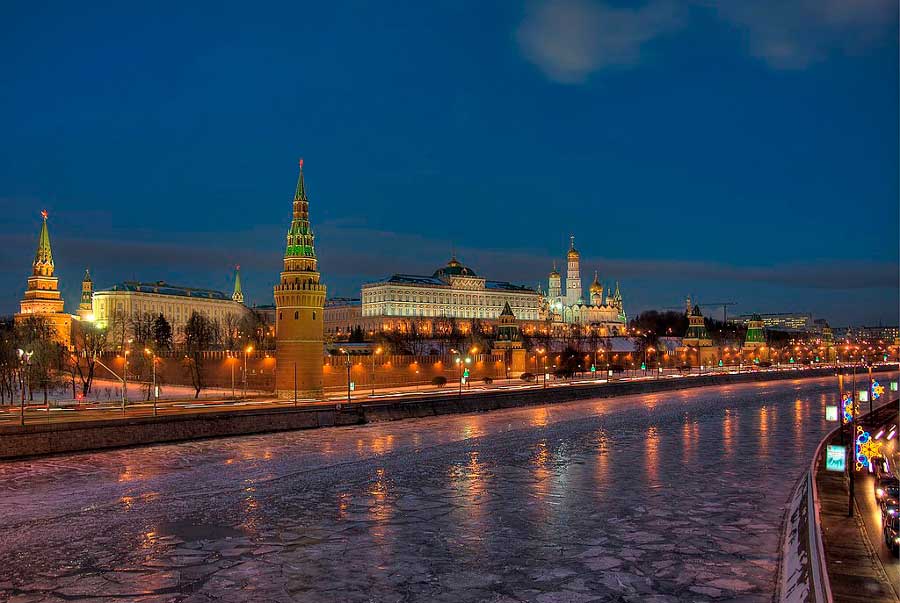Faculty Q&A: 24 Hours Of Chaos In Russia
Author: News Bureau
Posted: Thursday, July 6, 2023 12:00 AM
Categories:
School of Arts and Letters | Faculty/Staff | Pressroom
Macon, GA

The Kremlin, the center of Russian government, is in Moscow on the left bank of the Moskva River. (Image source: Wikipedia.)
In late June the Wagner group, a private military army that’s been fighting alongside Russia’s regular army in Ukraine, initiated an uprising – a so-called attempted coup - against the government. According to a CNBC report, Russia experts and political analysts characterized the uprising as “24 hours that shook the Kremlin” and the biggest challenge to President Vladimir Putin and the Russian elite in decades.
We asked Dr. Carol Melton, #MGA associate professor of history, to expound on this significant event.
Can you provide a brief overview of the Russian coup attempt? What were the main events and actors involved?
On June 23, 2023, the simmering tension between the Russian military authorities and the Wagner group, a private mercenary force organized and lead by Yergeny Prigozhin, a former criminal, caterer and Putin loyalist, boiled over into mutiny. Prigozhin withdrew Wagner forces from Ukraine, where they had been fighting the Ukrainians around Bakhmut and sustained thousands of casualties. The force crossed the border into Russian territory, seizing the city of Rostov-on-Don, the regional Russian military headquarters, without significant opposition. Prigozhin had become publicly critical of Valery Gerasimov and Sergei Shoigu, who were in charge of the Russian Ministry of Defense Forces, for failing to provide adequate supplies to Wagner and accused them of general mismanagement of the war in Ukraine. While never criticizing Putin by name, Prigozhin sent a column of forces north towards Moscow, 750 miles away. On the way, the Wagner group shot down Russian Army helicopters attempting to stop the march. Putin addressed the nation, invoking the specter of another Russian civil war and promising to defend Russian territory. According to Putin, Alexander Lukashenko, the president of Belarus who owes his position to Putin, stepped in and brokered a deal to defuse the situation by granting Prigozhin residence in Belarus.
How does the Russian coup attempt fit into the broader political landscape and power dynamics in Russia?
It's always hard to say what is going on inside Russia. Kremlin-watching is a great deal like reading tea leaves, but the coup attempt demonstrates a failure of Putin's longtime and, on the whole, successful divide-and-conquer method of ruling. Traditionally, he has cultivated competition and rivalry among the power groups in the governing bureaucracy. Hitler did this, too. The idea is to keep any faction from threatening his hold on power through a coup or other maneuvering by keeping them at each other's throats and informing on the activities of their colleagues. The fact that so many citizens and government and military officials seemed stunned and unwilling to act vigorously to protect Putin's regime may mean he has fewer active supporters than he hopes. The fact Putin was willing to be seen accepting a deal and let Prigozhin leave is a sign of current weakness. Putin is notoriously vindictive and I would not write a life insurance policy on Prigozhin.
What were the key challenges or obstacles faced by the coup plotters, and why did the attempt ultimately fail?
Taking over Moscow is not an easy matter and does not guarantee control of the Russian state. No one has done it since 1812, and that did not work out well for the French. It is highly unlikely that any force of 25,000 would be able to reach the capitol. The FSB has an estimated 4.5 million members, not to mention the Ministry of Defense forces, most of whom could have been relied on to support Putin. While the Putin regime has been very active in persecuting and prosecuting war protestors, they have largely ignored the actions of the far-right groups. Prigozhin had considerable latitude until he criticized the rationale for and conduct of the war in Ukraine. You notice, however, that Prigozhin never criticized Putin by name. This lends some support to Prigozhin's claim he was not trying to overthrow Putin.
Looking ahead, what are the potential implications or future developments that may arise as a result of the coup attempt in Russia?
The Wagner group is an international organization that operates on several continents and controls shell corporations that are profitable to the Kremlin and spread Russian influence. Putin can disband the mercenaries in Russia and incorporate them into the MOD or send them home as promised. Both are risky. The Wagner mutineers can spread their disenchantment with the war in Ukraine to the Russian Army if they sign contracts with it. If they go home, they can spread Prigozhin's narrative throughout Russia as eyewitnesses to the conduct of the war. This is particularly problematic if Putin wants to issue another mobilization order. He is also up for reelection next year. Putin may hope most of the Wagner group goes overseas. Putin has no clear successor if he is deposed or dies. Russia may well be sucked into some kind of struggle for power. So, in the meantime, Putin will have to concentrate on solidifying his own position and protecting himself. He may purge the military and other agencies. His primary interest will be remaining in power. He may be quite public and ruthless about it or do it more quietly, but he cannot afford to be seen as weak or indecisive. That is one reason he has been out in public and making national television appearances this week. He is reminding Russians what they are risking with civil war. The last one cost 10 million Russian lives.